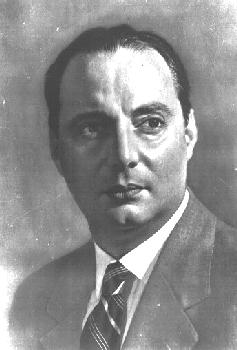Luis Batlle Berres facts for kids
Quick facts for kids
Luis Batlle
|
|
|---|---|

Luis Batlle Berres
|
|
| President of the National Council of Government of Uruguay | |
| In office 1 March 1955 – 1 March 1956 |
|
| Preceded by | Andrés Martínez Trueba |
| Succeeded by | Alberto Fermín Zubiría |
| 30th President of Uruguay | |
| In office 2 August 1947 – 1 March 1951 |
|
| Vice President | Alfeo Brum |
| Preceded by | Tomás Berreta |
| Succeeded by | Andrés Martínez Trueba |
| 4th Vice President of Uruguay | |
| In office 1 March 1947 – 2 August 1947 |
|
| President | Tomás Berreta |
| Preceded by | Alberto Guani |
| Succeeded by | Alfeo Brum |
| President of the Chamber of Deputies | |
| In office 1943–1945 |
|
| Preceded by | Euclides Sosa Aguiar |
| Succeeded by | Juan Francisco Guichón |
| Personal details | |
| Born | 26 November 1897 Montevideo, Uruguay |
| Died | 15 July 1964 (aged 66) Montevideo, Uruguay |
| Political party | Colorado Party |
| Spouse | Matilde Ibáñez Tálice |
| Relations | José Batlle y Ordóñez (uncle) César Batlle Pacheco (cousin) Lorenzo Batlle Pacheco (cousin) |
| Children | Jorge Luis Luis César Matilde Linda |
| Alma mater | University of the Republic |
| Occupation | Journalist Politician |
| Profession | Lawyer |
Luis Conrado Batlle y Berres (born November 26, 1897 – died July 15, 1964) was an important political leader in Uruguay. He was a journalist and a key member of the Colorado Party. He served as the President of Uruguay and also as Vice President.
Contents
Family Background and Early Life
Luis Batlle Berres came from a famous political family. His great-great-grandparents were from Catalonia, Spain. His father, Luis Batlle y Ordóñez, was also a political figure. His mother, Petrona Berres, was of Irish descent.
Luis's mother died when he was very young. His father remarried but passed away soon after, in 1908. After this, Luis went to live with his uncle, José Batlle y Ordóñez. His uncle was a very important person, serving as the President of Uruguay three times! Luis grew up with his cousins, César, Rafael, and Lorenzo Batlle Pacheco, on their family estate in the suburbs of Montevideo.
In 1927, Luis married Matilde Ibáñez Tálice. They had three children: Jorge Batlle, who also became a president later, Luis César, and Matilde Linda.
Political Career
Luis Batlle Berres was a strong member of the Colorado Party. He was known for his work as a journalist.
Serving as Vice President
In 1947, Luis Batlle Berres became the Vice President of Uruguay. He took over from Alberto Guani. Sadly, the President at the time, Tomás Berreta, passed away while in office. Because of this, Luis Batlle Berres, as Vice President, became the new President.
He was the fourth person to hold the office of Vice President in Uruguay. This important role was first created in 1934. Before becoming Vice President, Luis Batlle Berres also served as the President of the Chamber of Deputies (a part of the government) from 1943 to 1945.
First Time as President of Uruguay (1947-1951)
Luis Batlle Berres served as the President of Uruguay from 1947 to 1951. During his time as president, many important changes were made to help the people of Uruguay. His Vice President during this period was Alfeo Brum.
His government introduced several reforms:
- Helping Workers and Families: Laws were passed to help control prices of important goods so they wouldn't become too expensive. There were also efforts to improve working conditions, like introducing a 6-hour workday for jobs considered unhealthy. Family allowances were given to government workers and military members.
- Improving Rural Life: A law was created to help increase farm production and make life better for people working in the countryside. A special fund was set up to provide retirement and pension benefits for rural and domestic workers.
- Education and Health: More money was put into school canteens and milk programs. New classes were opened for children with hearing and sight problems. There were also efforts to improve teacher training, especially for rural education and children with special needs. The government also worked to fight diseases like smallpox and other childhood illnesses.
- Housing Support: A special section was created in the Mortgage Bank of Uruguay to help people get loans to buy, build, or improve their homes. This was meant to solve housing problems in the country.
- New Political Ideas: Within his own party, Luis Batlle Berres is remembered for starting a new political movement called Neo-Batllism.
Second Time in Leadership (1955-1956)
After his first term as President, Luis Batlle Berres later served as the President of the National Council of Government of Uruguay from 1955 to 1956. This means he held a top leadership position again, following and preceding Andrés Martínez Trueba.
See also
 In Spanish: Luis Batlle Berres para niños
In Spanish: Luis Batlle Berres para niños
 | Delilah Pierce |
 | Gordon Parks |
 | Augusta Savage |
 | Charles Ethan Porter |

